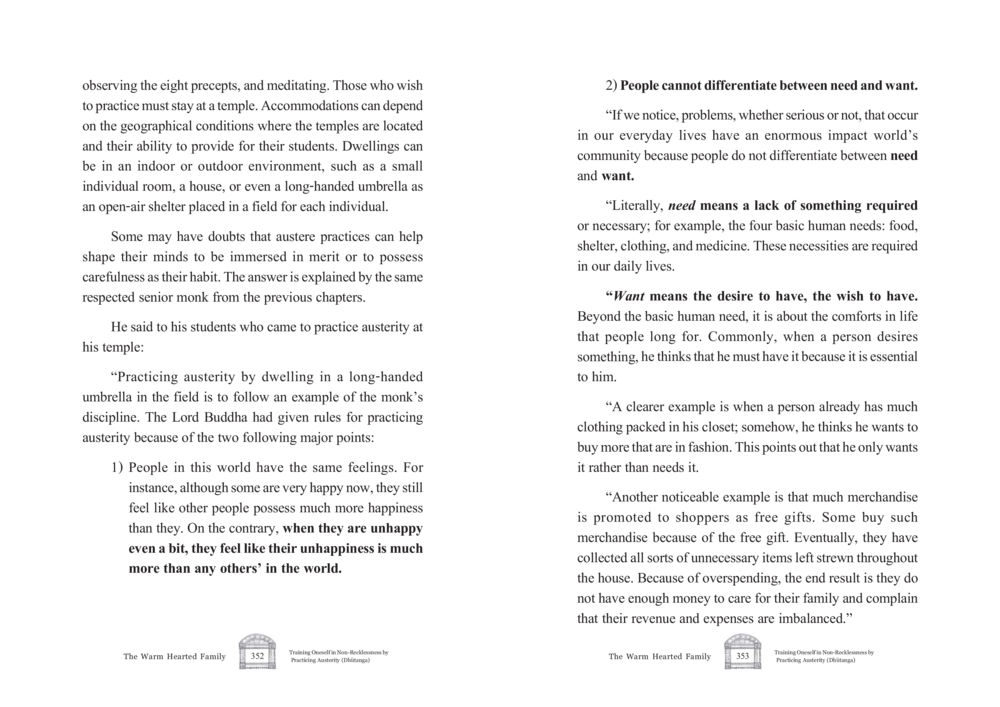Practicing Austerity and the Eight Precepts : หน้า 177/207
The Warm Hearted Family : หน้า 177/207 Learn about the practice of austerity, the Eight Precepts, and the distinction between needs and wants.
1 ครั้ง

สรุปเนื้อหา
การปฏิบัติอ austerity จึงเป็นทางเลือกสำหรับผู้ที่ต้องการสร้างนิสัยแห่งความระมัดระวัง โดยการใช้ชีวิตตามแบบอย่างพระสงฆ์และการแยกแยะด้านความต้องการและความอยาก พระพุทธเจ้าได้มอบกฎใช้อาศัยในภูมิประเทศต่างกัน ทั้งในแบบเดี่ยวหรือในร่มเพื่อความเหมาะสม บริบทนี้ชี้ให้เห็นถึงความสำคัญของความต้องการและความอยากในชีวิตประจำวัน ซึ่งการมีเสื้อผ้ามากมายอาจจะทำให้เกิดความต้องการมากกว่าความจำเป็นในการใช้ชีวิตที่เป็นพื้นฐาน จึงเป็นต้นเหตุของปัญหาทางการเงินในครอบครัว.
หัวข้อประเด็น
-การปฏิบัติศีลแปด
-การทำสมาธิ
-การแยกแยะระหว่างความต้องการและความอยาก
-อุปกรณ์นั่งสมาธิ
-ผลกระทบทางสังคม
ข้อความต้นฉบับในหน้า
observing the eight precepts, and meditating. Those who wish to practice must stay at a temple. Accommodations can depend on the geographical conditions where the temples are located and their ability to provide for their students. Dwellings can be in an indoor or outdoor environment, such as a small individual room, a house, or even a long-handed umbrella as an open-air shelter placed in a field for each individual.
Some may have doubts that austere practices can help shape their minds to be immersed in merit or to possess carefulness as their habit. The answer is explained by the same respected senior monk from the previous chapters.
He said to his students who came to practice austerity at this temple:
“Practicing austerity by dwelling in a long-handed umbrella in the field is to follow an example of the monk’s discipline. The Lord Buddha had given rules for practicing austerity because of the two following major points:
1) People in this world have the same feelings. For instance, although some are very happy now, they still feel like other people possess much more happiness than they. On the contrary, when they are unhappy even a bit, they feel like their unhappiness is much more than any others’ in the world.
2) People cannot differentiate between need and want.
“If we notice, problems, whether serious or not, that occur in our everyday lives have an enormous impact world’s community because people do not differentiate between need and want.
“Literally, need means a lack of something required or necessary; for example, the four basic human needs: food, shelter, clothing, and medicine. These necessities are required in our daily lives.
“Want means the desire to have, the wish to have. Beyond the basic human need, it is about the comforts in life that people long for. Commonly, when a person desires something, he thinks that he must have it because it is essential to him.
“A clearer example is when a person already has much clothing packed in his closet; somehow, he thinks he wants to buy more that are in fashion. This points out that he only wants it rather than needs it.
“Another noticeable example is that much merchandise is promoted to shoppers as free gifts. Some buy such merchandise because of the free gift. Eventually, they have collected all sorts of unnecessary items left strewn throughout the house. Because of overspending, the end result is they do not have enough money to care for their family and complain that their revenue and expenses are imbalanced.”
หน้าหนังสือทั้งหมด

1

2

3

4

5

6

7

8

9

10

11

12

13

14

15

16

17

18

19

20

21

22

23

24

25

26

27

28

29

30

31

32

33

34

35

36

37

38

39

40

41

42

43

44

45

46

47

48

49

50

51

52

53

54

55

56

57

58

59

60

61

62

63

64

65

66

67

68

69

70

71

72

73

74

75

76

77

78

79

80

81

82

83

84

85

86

87

88

89

90

91

92

93

94

95

96

97

98

99

100

101

102

103

104

105

106

107

108

109

110

111

112

113

114

115

116

117

118

119

120

121

122

123

124

125

126

127

128

129

130

131

132

133

134

135

136

137

138

139

140

141

142

143

144

145

146

147

148

149

150

151

152

153

154

155

156

157

158

159

160

161

162

163

164

165

166

167

168

169

170

171

172

173

174

175

176

177

178

179

180

181

182

183

184

185

186

187

188

189

190

191

192

193

194

195

196

197

198

199

200

201

202

203

204

205

206

207
หนังสือที่เกี่ยวข้อง
Load More
